
High-Level Coalition on Health and Energy
The High-Level Coalition on Health and Energy, convened by the WHO Director-General Dr Tedros Ghebreyesus, is comprised of leaders from governments supporting HEPA as well as leaders from selected international organizations and other high-level health and energy champions. The objective of the Coalition is to strengthen cooperation between health and energy sectors, increase political momentum, spur investments, mobilize public support and drive practical solutions.
The first (virtual) meeting of the Coalition took place in June 2021 and resulted with the unanimous endorsement of the Strategic Roadmap to promote healthier populations through clean and sustainable energy by all Coalition members.
The second meeting took place in October 2022 to discuss and identify concrete actions to accelerate clean cooking and electrification of health-care facilities in countries, building on the priorities identified in the Strategic Roadmap on Health and Energy. The outcome of the second meeting was a Call to Action to increase climate resilience of health-care facilities & air quality through sustainable energy. All coalition members endorsed this document and urged the international community gathering at COP27 to make every effort to accelerate clean and sustainable energy access for health-care facilities and households.
Members of the High-Level Coalition
Member States

Dr Matthew Opoku Prempeh, Minister of Energy, Ghana
Dr Matthew Opoku Prempeh is Minister of Energy of Republic of Ghana. As a member of parliament, he has served on numerous committees, including Health, Appointments, Special Budget, Environment, Science, Technology and Innovation. Before taking up this position, Dr Prempeh was CEO of Keyedmap Services Limited, a company in the security, communication and energy sectors. He also worked in Ghana and the United Kingdom and is a member of the Royal College of Physicians and Surgeons of the United Kingdom. Dr. Prempeh studied Human Biology and Medicine at the Kwame Nkrumah University of Science and Technology and holds aMaster’s degree in Clinical Epidemiology from the Netherlands Institute of Health Sciences. He further studied Leadership and Government at Kennedy School of Government at Harvard University.
"With the transition to clean energy, Ghana wants to achieve universal access to electricity by 2030. This improves the development, the industrialization and job security in the country. With the Agenda 111, Ghana also wants to attain universal health coverage while supporting regional hospitals across the country. The availability of electricity is crucial to provide power not only to industries but also for health care services to make life worth living for all communities and to positively affect the well-being of all citizens."
Dr José Manuel Matheu, Secretary of State for Health, Honduras
Mr Erick Tejada Carbajal, Secretary of Energy, Natural Resources, Environment and Mines, Honduras

Dr Mansukh Mandaviya, Minister of Health and Family Welfare, India
Mansukh Mandaviya is the Minister of Health and Family Welfare and Chemicals and Fertilizers, in the Government of India. Formerly, he was Minister of State for Ports, Shipping and Waterways (Independent Charge) and Chemicals and Fertilisers in the Government of India. Dr Mandaviya holds a postgraduate degree in Political Science from Bhavnagar University. Mansukh Mandaviya has played a vital role in the growth and development of New India. He was awarded ‘Men for Menstruation’ by UNICEF on Menstrual Hygiene Day for his initiative of ‘Suvidha Sanitary Napkin’. Dr Mandaviya has also been at the forefront of several environmental issues and worked towards a clean and green nation. In May 2019, Mansukh Mandaviya took oath as a Minister of State in the Council of Ministers, Government of India. Dr Mandaviya also represented India in the World Economic Forum at Davos, Switzerland in January 2020.
"Investing in energy is instrumental in unlocking progress across the Sustainable Development Agenda. Investments will reduce poverty, contribute to more inclusive, sustainable growth and generate great health benefits. It is our joint responsibility to build political commitment, to mobilize resources, to strengthen the capacity of the health and energy sectors and to ensure universal access to clean and sustainable energy in order to protect health."
Dr Budi Gunadi Sadikin, Minister of Health, Indonesia

Minister of Energy and Mineral Resources
Mr Arifin Tasrif, Minister of Energy and Mineral Resources, Indonesia
Mr Tasrif is an Indonesian executive who is the current Minister for Energy & Mineral Resources in Joko Widodo’s Developed Indonesia Cabinet. Previously, he was assigned as Indonesia’s Ambassador to Japan in 2017 until October 2019. Mr Tasrif has broad experience in the fertilizer industry. Prior to his assignment as Ambassador, he held the position as Chief Executive Officer in three different state-owned companies in the fertilizer industry, namely PT. Pupuk Indonesia, PT. Pupuk Sriwidjaja, and also PT. Petrokimia Gresik. Mr Arifin studied chemical engineering at the Bandung Institute of Technology (ITB) and graduated in 1977.
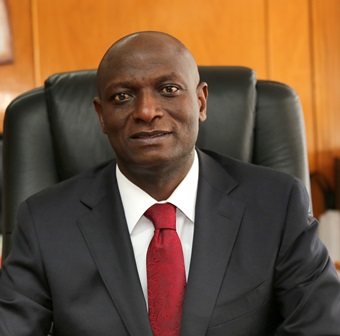
Mr Charles Keter, Former Cabinet Secretary, Ministry of Energy, Kenya
As Kenya’s Cabinet Secretary for Energy, Mr. Keter is responsible for the oversight, policy and governance of the Ministry’s mandate: the provision of clean, sustainable, affordable, reliable, secure and quality energy services, for national development while protecting the environment. His main focus is on the national key flagship projects under the Jubilee Government, which incorporates: Universal Electricity Access, Transmission and Infrastructure Development and the Accelerated Generation of Power amongst others
"Implementing the Ministry's mission is critical to support the Government's goals of growing the economy for national prosperity, promoting leadership in the sector, enhancing regional interconnectivity through technology and innovation, while also protecting the environment."
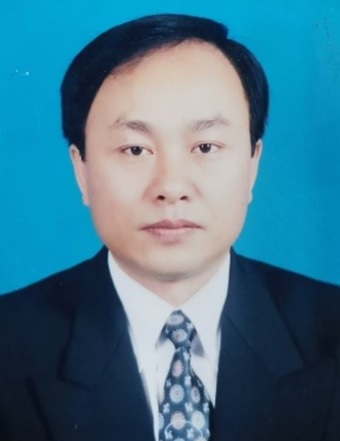
Minister of Health, Bounfeng Phoummalaysith
Dr Bounfeng Phoummalaysith, Minister of Public Health, Lao People's Democratic Republic
Dr Bounfeng Phoummalaysith is the Minister of Health in Lao PDR. He began working in the Ministry of Health in 1990 when he was the Deputy Head of Narcotic and Toxication Division until 1997. He became the Head of Secretary Division, Cabinet, MOH in 2000, and he was Deputy Director of Cabinet, MOH, from 2003 to 2016. He was appointed the Director of National Health Insurance Bureau, MOH, in 2016; and Vice-Minister of Health from 2019-2020. Dr Phoummalaysith obtained a Master of Pharmaceutical Sciences from Kazakhstan, a Master of Sciences and a Doctor of Philosophy in Healthcare Administration from Nagoya University, Japan.
Mr Daovong Phonekeo, Minister of Energy and Mines, Lao People's Democratic Republic

Mr Enkhbold Sereejav, Minister of Health, Mongolia
"By joining this High-Level Coalition, it will be a great experience for Mongolia’s future aim to reduce air pollution and improve air quality by presenting evidence based disease morbidity and mortality due to air pollution."
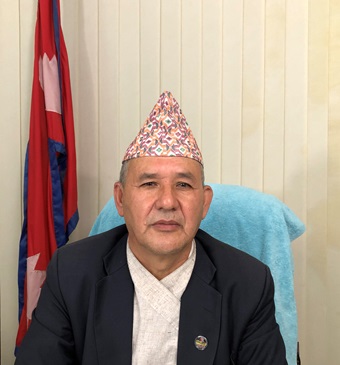
Minister of Health, Nepal
Mr Bhawani Prasad Khapung, Minister of Health and Population, Nepal
Mr Bhawani Parasad Khapung is currently the Minister of Health and Population for the Government of Nepal. Prior to this, he was State Minister of the same ministry since 8th October 2021. He has about 40 years of political career in different capacities. During this period, he also served as elected Chairperson of then Morahang Village Development Committee in Terhathum District. Since 2013 he has been elected representative initially for Constitutional Assembly and then for House of Representatives since 2017. He also has about ten years of teaching experience and actively engaged in cooperatives movement. As a head of health ministry, he has been putting his best efforts through overall policy formulation, planning, organization and coordination of the health sector in order to meet the goal of the ministry to improve the health status of all people living in the country.
“Nepal has a very high burden of non-communicable diseases, and we clearly understand that air pollution is one of the main reasons for this. Considering this, we have been promoting clean cooking solutions for this and collaborating with energy sector for the same. We also have significant progress in electrification in health-care facilities. However, the joint efforts are still needed in terms of expanding access to electrification and ensuring supply of regular, quality and clean energy in health facilities. Accordingly, we reflected importance of sustainable and clean energy for better health not only in policy documents but also materializing it.”
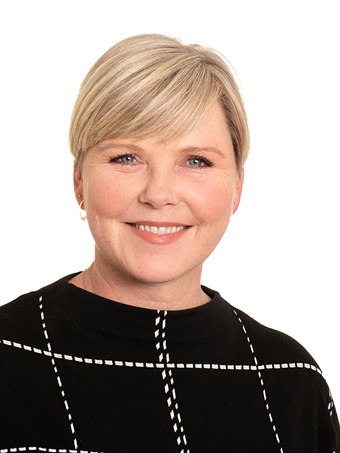
Minister of International Development Anne Beathe Tvinnereim.
Ms Anne Beathe Tvinnereim, Minister of International Development, Norway
The Minister of International Development is responsible for international development efforts in countries outside the OSCE, the Middle East, North Africa and Afghanistan. She is also responsible for development cooperation under the auspices of the UN system, the World Bank, the regional development banks and other global funds and programmes. In addition, she is Minister for Nordic Co-operation and responsible for Norad, Norec and Norfund.
"I believe that stronger collaboration between actors working within the health, energy and climate change fields is essential to achieve several of the Sustainable Development Goals, as well as the Paris Agreement."
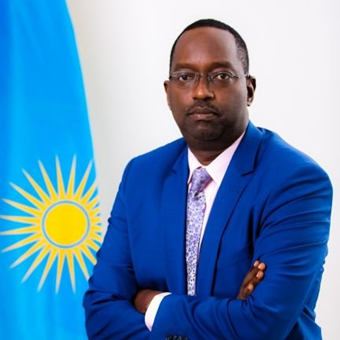
Dr Daniel Ngamije, Minister of Health, Rwanda
Dr Daniel Ngamije is the Rwanda Minister of Health since February 2020. In June 2018 he joined WHO's Rwanda Country Office as National Programme Officer. From Februar 2007 to June 2017 he served as the Coordinator of the Project Implementation Unit (PMU) which later converted to the Single Project Implementation Unit (SPIU), where he coordinated and supported the process of funds mobilization and grant negotiation with partners such the Global Fund, World Bank and other bilateral partners. Prior to that, Dr Ngamije held various positions at the Ministry of Health including Coordinator of the Malaria National Program and Regional Director of Health and Social Affairs in Gitarama province. Before being in management positions, he served as Physician and Medical Doctor at Kabgayi Hospital. Dr Ngamije completed a Bachelor of Medicine and Surgery at Université de Kinshasa, DRC and a Masters Degree of Medicine in Public Health from Université Libre de Bruxelles, in Brussels, Belgium.

Dr Austin Demby, Minister of Health and Sanitation, Sierra Leone
Dr Austin Demby is currently the Minister of Health and Sanitation for the Government of Sierra Leone. Prior to assuming his current role, Dr Demby served as the Acting Director of the Office of Global Health at the U.S. Health Resources and Services Administration (HRSA). Dr Demby holds a doctorate degree in Clinical Microbiology from the University of London, England, a master’s degree in public health-epidemiology/biostatistics from the University of Michigan, and a Bachelor of Science degree with honors from Fourah Bay College, University of Sierra Leone. He has held research appointments at several institutions, including: Special Pathogens Branch, Virus Reference Laboratory, Central Public Health Laboratory Services, Colindale, United Kingdom, 1990-1993; Division of Pathology, Center for Applied Microbiology and Research, Porton Down, United Kingdom, 1993-1994; Special Pathogens Branch, DVRD, NCID, 1994-1997; and Diagnostic Mycobacteriology, TMB, DASTLR, NCID, 1998-1999.

Mr Alhaji Kanja Sesay, Minister of Energy, Sierra Leone
Mr Alhaji Kanja Sesay was appointed as Minister of Energy by the fifth Parliament of the second Republic on the 4th of May 2018. He has a wealth of experience in having served as Commissioner for the National Commission for Social Action (NaCSA). He founded and served as Executive Director of the Association for Rural Development (ARD), a microcredit finance institution in Sierra Leone. He also served as chairman of its Board of Directors. Mr. Alhaji Kanja Sesay has also previously served as Chairman of the Executive Committee of the Sierra Leone Association of Non-Governmental Organisations (SLANGO) and member of the board of directors of Sierra Leone Export and Investment Corporation (SLEDIC). After graduating from university, he taught for several years at the Ahmadiyya Muslim Secondary School and Prince of Wales Secondary School in Freetown.
"We strongly believe that the low electricity access rate and the need to improve the economic and social life of our people across the country is a strong case for our participation in the High-Level Coalition on Health and Energy, to rapidly provide energy access."
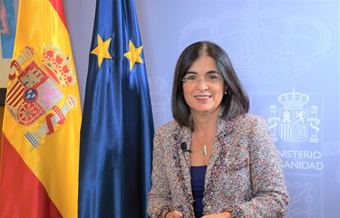
Minister Carolina Darias
Ms Carolina Darias San Sebastian, Minister of Health, Spain
Ms Carolina Darias was appointed as Minister of Health of the Government of Spain on January 27, 2021. Previously, she held the position of Minister of Territorial Policy and Public Function from January 2020. Ms Darias is a civil servant of the Higher Corps of Administrators of the Autonomous Community of the Canary Islands. She has graduated in Law from the University of La Laguna (Tenerife) and has held different positions at local, regional and central levels. Previously, she has been a councilor in the City of Las Palmas, a sub-delegate of the Government of Spain in the province of Las Palmas, a regional deputy in the Canarian Parliament, a delegate of the Government of Spain and spokesperson for the Spanish Socialist Workers' Party in Gran Canaria. In June 2015, she was elected president of the Parliament of the Canary Islands. From July 2019 until her appointment as Minister of Territorial Policy and Public Function, she was the Minister of Economy, Knowledge and Employment in the Canarian government.

Ms Teresa Ribera Rodriguez, Deputy Prime Minister and Minister for the Ecological Transition and Demographic Challenge, Spain
Ms Ribera is Deputy Prime Minister of the Government of Spain and Minister for the Ecological Transition and Demographic Challenge. Under her current tenure (Jan. 2020-), Spain has integrated the energy and climate policy agendas and approved the Integrated National Energy and Climate Plan (2021-2030), the Long Term Decarbonisation Strategy and Spain's first Climate Change and Energy Transition Act. Prior to that, Ms Ribera was Director of the Institute for Sustainable Development and International Relations (IDDRI) from 2014 to 2018, and enabled the Institute to play a key role in the negotiation of the Paris Climate Agreement and the transition towards sustainable development. She served as Spanish Secretary of State for Climate Change from 2008 to 2011, responsible for environmental and climate policies.
"It is an honour for the Government of Spain to join the High-Level Coalition on Health and Energy and to continue our close cooperation with the World Health Organization on these critical agendas. We will pursue our work with the international community to promote further developments and the adoption of concrete energy targets which result in improved air quality and enhanced access to health worldwide."
Dr Odete Maria Freitas Belo, Minister of Health, Timor-Leste
"The Ministry of Health in Timor-Leste recognises the close link between health and energy and has been working with all stakeholders to drive policies that will promote good practices in the areas of health, energy and climate change. Moving forward, we will strive to ensure that people of Timor-Leste breathe clean air and are protected from diseases resulting from pollution."

Dr Victor da Conceição Soares, Minister for Petroleum and Minerals, Timor-Leste
Dr Victor da Conceição Soares is an engineer, lecturer, researcher and politician. He got a bachelor degree in Mechanical Production from the Bandung Institute of Technology (ITB), Indonesia, in 1992 and a honour degree in Mechanical Engineering from the University of Catholic Widya Karya Malang, Indonesia, in 1999. Furthermore, he completed a master degree in Mechanical Engineering from the Nagaoka University of Technology, Japan, in 2004 and then completed his PhD in Technical Science of Territorial Planning and Environment from the University of Evora, Portugal, focusing on Biosystems Engineering, Renewable Energy and Sustainable Wind Power in Timor-Leste. He served as the former Vice-Minister of Education for Technical and Higher Education from 2006 to 2007. Since June 2020 he serves as the Minister for Petroleum and Minerals under the 8th Constitutional Government of the Democratic Republic of Timor-Leste.
"Currently 90% of the population in Timor-Leste has access to electricity and it is expected that it will gradually revolutionarize the people's approach to daily energy usage. Our larger goal is to strengthen intersectional cooperation to minimize the impact of the activity within the petroleum sector, public health and the environment in Timor-Leste. "
International Organizations

Mr Charles Okeahalam, Chairperson of the International Board of Directors, Amref Health Africa
Mr Okeahalam is a co-founder of AGH Capital Group and has served as CEO of the company from 2003 to 2018. AGH Capital, founded in 2001, is an investment company with holdings in industrial equipment, energy, and real estate investment trusts. Mr Okeahalam has served as a non-executive director of several companies including ABSA, Sun International, South African Airways and Bond Exchange, as chairman of Heritage Bank and as chairman of Nigeria Mortgage Refinance Company. Prior to joining AGH Capital, he was a professor of finance at University of the Witwatersrand (WITS) between 1998 to 2002. He has served on the Council of University of Cape Town and as a trustee of African Union Foundation. Charles Okeahalam is involved in the support and sponsorship of education, particularly for female students from low-income households. His academic qualifications include a Ph.D. in Economics-(Econometrics) at University of London, awarded in 1991. He has researched and written extensively on finance in Africa and in 2010 earned a D.Sc. from the University of Exeter for this. He has received several awards, notably a Houblon-Norman Senior Fellowship from the Bank of England in 2001. He is also an honorary professor at WITS.
"Energy supply plays a salient role in the delivery of health outcomes. Indeed, demand for energy and health outcomes are interdependent. However, pressures on the environment mean that energy must be generated in a sustainable way. To ensure that neither energy supply nor health outcomes are compromised, energy must be delivered cost-effectively and conserved efficiently. This necessitates further investment in innovative energy technologies and climate finance. Policies should be aimed at; enhancing social awareness on the symbiosis between energy and health outcomes and highlighting the importance of support for innovative solutions can play and active cooperation between the health and energy sectors."

Ms Dymphna van der Lans, Chief Executive Officer, Clean Cooking Alliance
Ms van der Lans is the Chief Executive Officer of the Clean Cooking Alliance. She brings more than 25 years of experience managing and leading global development, energy, and climate initiatives in both nonprofit and private sectors. Most recently, she led international corporate engagement with the World Wildlife Fund’s Climate & Energy team. Previously, she worked with the Clinton Foundation as CEO of the Clinton Climate Initiative and has served as the senior director for public policy programs at the German Marshall Fund of the United States. She has also served as the director of global renewables, infrastructure, and energy efficiency at a specialist investment banking firm in London, and for seven years at BP, where her last appointment was as BP Alternative Energy’s director of distributed energy markets.
"Providing clean energy to households is critical to achieving global climate and sustainable development goals. Yet with fewer than ten years until we reach 2030, the world remains far off track to reach SDG7. CCA is proud to work alongside WHO and the HEPA coalition to incentivize clean cooking transitions and support governments in setting ambitious clean cooking priorities and implementing supportive policies."

Ms Sheila Oparaocha, Executive Director, ENERGIA
Ms Oparaocha is the Executive Director of the ENERGIA International Network on Gender and Sustainable Energy. ENERGIA is an International Network of like-minded organisations and professionals that was established in 1996 to create an institutional base for galvanising action aimed at integrating gender into the energy access agenda of developing countries. ENERGIA’s programme of work has supported over 50 partner organizations in 18 countries in Africa and Asia. She has over twenty-one years of experience working at the intersectionality of gender equality, women empowerment and energy access, specifically in the areas of women entrepreneurship development, gender mainstreaming in energy programmes, international policy advocacy, research and evidence development, network building and knowledge management. Ms Oparaocha is the co-chair of the Technical Advisory Group on the Sustainable Development Goal 7.
"Women's health, livelihood and wellbeing are greatly interlinked with access to electricity and clean cooking technologies. They play a pivotal role in supplying clean energy services, including clean cooking solutions, and raising awareness on the use of these services. However, women as entrepreneurs, users and decision-makers are strongly under-represented at all levels and they are disproportionately impacted by the unequal access to these services. This has severe consequences on their health, income, employment and empowerment. If we want to reduce the number of people relying on traditional fuels by 2030 and protect the health of women, men and young people, we need to intensify the efforts and scale up our actions. Substantial investments in clean energy businesses, public and private support to adopt clean cooking and sustainable energy services in health facilities, political drive and adequate representation of women at the negotiation table will be needed to achieve universal access to clean cooking solutions. We cannot achieve the targets of SDG7 on energy, including clean cooking, without a holistic approach that tackles gender issues in the sector and supports the integration of gender in energy policies."
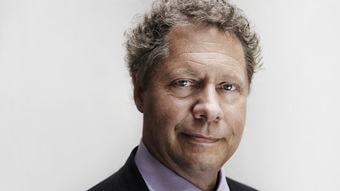
Dr Seth Berkley, Chief Executive Officer, GAVI, The Vaccine Alliance
A medical doctor and infectious disease epidemiologist, Dr. Berkley joined Gavi, the Vaccine Alliance as its CEO in August 2011. Under his leadership, Gavi has accelerated global immunisation access in its mission to save lives, reduce poverty and protect the world against the threat of epidemics and pandemics. During his tenure, Gavi has increased coverage of routine immunisation in lower-income countries. At the beginning of the COVID-19 pandemic, Dr. Berkley spearheaded the creation of COVAX, the only multilateral global solution aimed at ending the acute phase of the pandemic by providing equitable access to COVID-19 vaccines for people in all countries. Prior to Gavi, in 1996, Dr Berkley founded the International AIDS Vaccine Initiative (IAVI). Previously, Dr. Berkley served as an officer of the Health Sciences Division at The Rockefeller Foundation. He has worked for the Center for Infectious Diseases of the US Centers for Disease Control and Prevention (CDC), the Massachusetts Department of Public Health and the Carter Center. Dr. Berkley received his undergraduate and medical degrees from Brown University and trained in internal medicine at Harvard University. In 2021, Dr Berkley received an Honorary Doctor of Science degree from Makerere University School of Public Health in Uganda.
"The link between health and energy is stronger than most people realize, particularly when it comes to people living in the most poorest countries. Together we can protect more people and achieve the Sustainable Development Goal 7 for affordable, reliable, sustainable and modern energy for all by 2030."
Mr Per Heggenes, CEO, IKEA Foundation

Mr Francesco La Camera, Director-General, International Renewable Energy Agency (IRENA)
Mr La Camera took office on 4 April 2019 as Director-General of IRENA and brings more than thirty years of experience in the fields of climate, sustainability and international cooperation. In his role, Mr La Camera is responsible for leading the delivery of IRENA’s work programme and strategy in cooperation with the Agency’s member states. At a critical time of facing climate change and achieving the Sustainable Development Goals, Mr La Camera redefines the structure and operations of the Agency in response to the urgent needs of its members. Under his leadership, the Agency has forged a series of new strategic partnerships with UN organisations including UNDP, UNFCCC and Green Climate Fund among others.
"The energy-health nexus is of great importance to global development. Energy solutions that are clean, reliable and renewable-based can play a key role in the electrification of healthcare facilities worldwide and offer households clean solutions for cooking."
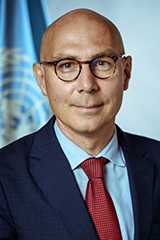
High Commissioner for Human Rights
Mr Volker Türk, High Commissioner, Office of the United Nations High Commissioner for Human Rights (OHCHR)
Prior to his appointment as High Commissioner, Mr. Türk was the Under-Secretary-General for Policy in the Executive Office of the United Nations Secretary-General where he coordinated global policy work. He previously served as Assistant Secretary-General for Strategic Coordination in the Executive Office of the Secretary-General (2019-2021). As Assistant High Commissioner for Protection in the Office of the United Nations High Commissioner for Refugees (UNHCR) in Geneva (2015-2019), Mr. Türk played a key role in the development of the landmark Global Compact on Refugees. Over the course of his career, he held a number of key positions including at UNHCR headquarters where he served as Director of the Division of International Protection (2009-2015); Director of Organizational Development and Management (2008-2009); and Chief of Section, Protection Policy and Legal Advice (2000-2004). Mr. Türk also served UNHCR around the world, including as Representative in Malaysia; Assistant Chief of Mission in Kosovo and in Bosnia and Herzegovina, respectively; Regional Protection Coordinator in the Democratic Republic of the Congo; and in Kuwait. Mr. Türk holds a doctorate in international law from the University of Vienna and a Master of Laws degree from the University of Linz, Austria.
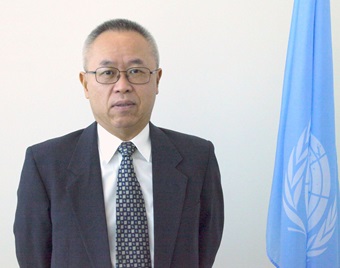
Li Junhua
Mr Li Junhua, Under-Secretary-General, Departement of United Nations Economic and Social Affairs (UN DESA)
Prior to his appointment as Under-Secretary-General, Mr Li was Ambassador Extraordinary and Plenipotentiary of China to Italy and San Marino. Mr Li began his career at the Foreign Affairs Ministry in 1985. Since then, he has served in various capacities, including as Director General of the Department of International Organizations and Conferences, Ministry of Foreign Affairs of China (2013-2019), Ambassador Extraordinary and Plenipotentiary of China to Myanmar (2010-2012), Deputy Director General of the Department of International Organizations and Conferences (2008-2010), Minister Counselor (Political), Permanent Mission of the People’s Republic of China to the United Nations (2003-2008), Division Director and Counselor in charge of UN General Assembly and Security Council Affairs (2001-2003), Second and First Secretary, Permanent Mission of the People’s Republic of China to the United Nations (1997-2001). Third and Second Secretary, the Department of International Organizations and Conferences (1992-1997) and Assistant to the Permanent Representative, Permanent Mission of China to the UN Economic and Social Commission for Asia and the Pacific, Bangkok (1986-1992). Mr Li holds a Master’s in International Public Policy, School of Advanced International Studies, Johns Hopkins University.
“Achieving SDG 7 on energy will spur progress across many other Sustainable Development Goals and targets. To ensure sustainable energy for all, we cannot leave 1 billion people without electricity and 3 billion people without clean cooking solutions. We must rapidly accelerate energy transitions to achieve net-zero emissions by 2050, even as we expand energy access.”
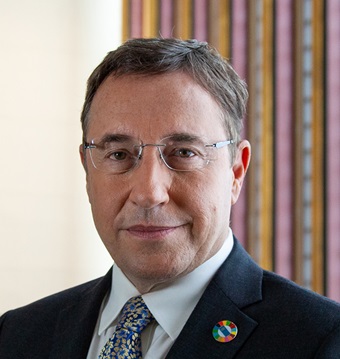
Mr Achim Steiner, Administrator, United Nations Development Programme (UNDP)
Mr Steiner became Administrator of UNDP in 2017 and was appointed to a second four-year term beginning in June 2021. Mr Steiner is also the Vice-Chair of the UN Sustainable Development Group, which unites 40 entities of the UN system that work to support sustainable development. Prior to joining UNDP, he was Director of the Oxford Martin School and Professorial Fellow of Balliol College, University of Oxford. He led the United Nations Environment Programme (2006-2016), helping governments invest in clean technologies and renewable energy. He was also Director-General of the United Nations Office at Nairobi. Mr Steiner previously held other notable positions including Director General of the International Union for the Conservation of Nature and Secretary General of the World Commission on Dams.
"I welcome the creation of the High-Level Coalition on Health and Energy, which will be pivotal to rally the political support needed to accelerate action on sustainable energy services in health facilities and to improve access to clean cooking. This is a catalytic opportunity to bring real change in the lives of billions of people around the world."

Ms Catherine Russell, Executive Director, United Nations Children's Fund (UNICEF)
Ms Russell was appointed Executive Director by the UN Secretary General on February 1, 2022. From 2020 to 2022, Ms Russell served under President Joe Biden as Assistant to the President and Director of the White House Office of Presidential Personnel. She previously served from 2013 to 2017 as Ambassador-at-Large for Global Women’s Issues at the U.S. Department of State, where she was the principal architect of the groundbreaking “U.S. Global Strategy to Empower Adolescent Girls.” Before re-entering government service in 2020, she taught at the Harvard Kennedy School as an Institute of Politics Fellow. She also served as the board co-chair of the Women’s Foreign Policy Group, and as a board member of Women for Women International, the Sesame Street Advisory Board, the KIVA Advisory Council, and the Thomson Reuters Foundation’s Trust Women initiative. She holds a Bachelor of Arts in Philosophy, magna cum laude, from Boston College and a Juris Doctor degree from the George Washington University Law School.
“Clean, sustainable energy is critical for children. This is not only because it reduces pollutants that harm children and helps reduce emissions that contribute to the climate crisis. It also improves the quality, the accessibility and the reliability of services that children need to survive, grow and thrive. The High-Level Coalition on Health and Energy recognises this critical link between sustainable energy and public health.”

Mr Filippo Grandi, High Commissioner, United Nations High Commissioner for Refugees (UNHCR)
Mr. Grandi was first elected by the UN General Assembly as the 11th High Commissioner for Refugees on 1 January 2016 for a five-year term and was re-elected to serve until 30 June 2023. From 2010 to 2014, he served as Commissioner-General of the UN Agency for Palestine Refugees (UNRWA), having previously been its Deputy Commissioner-General since 2005. He also served as Deputy Special Representative of the UN Secretary-General in Afghanistan and has worked with NGOs and UNHCR in Africa, Asia, the Middle East and at the Geneva headquarters.
"Supporting access to health services and to clean and sustainable energy can transform and rebuild lives. The inclusion of refugees and other displaced populations in national systems and plans will not only improve their protection and wellbeing, but it is also an investment in our collective future."

Dr Rajiv Shah, President, The Rockefeller Foundation
Dr Shah serves as President of The Rockefeller Foundation, a global institution with a mission to promote the well-being of humanity around the world. The Foundation applies data, science, and innovation to improve health for all, nourish the world, end energy poverty, and enable meaningful economic mobility. In 2009, he was appointed USAID Administrator by President Obama where he notably led the U.S. response to the Haiti earthquake and the West African Ebola pandemic. Previously, he served at the Bill & Melinda Gates Foundation, where he created the International Financing Facility for Immunization which helped reshape the global vaccine industry and save millions of lives.
“Every family in the world deserves access to a health care worker to stay healthy. You cannot run an effective healthcare clinic without electricity for lighting, sterilization of equipment and storage of vital vaccines and medication. A quarter of healthcare facilities in sub-Saharan Africa and parts of Asia have no electricity, and nearly three-quarters of those have unreliable power. We’ve been reminded again during the pandemic why it is so risky for only the wealthy few to have access to the modern technology and data-driven health care that requires reliable electricity. The Rockefeller Foundation is asking others to join us in a once-in-a-generation investment to build renewable electricity infrastructure that will create a more equitable global health system and provide the jobs needed to recover from the Covid 19 pandemic.”
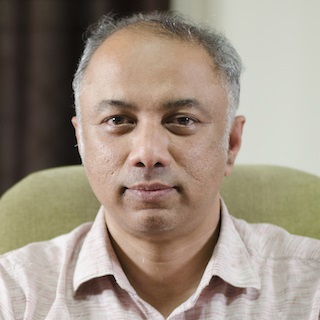
CEO Selco Foundation
Mr Harish Hande, CEO & Founder, SELCO Foundation
Mr Harish Hande is a renewable energy entrepreneur with over 24 years of grassroots experience in understanding, developing and deploying sustainable energy solutions for underserved communities. Born in rural Karnataka, Mr Hande went on to pursue his graduation from the Indian Institute of Technology, Kharagpur and a PhD from University of Massachusetts. In order to catalyze deployment of sustainable solutions, SELCO operates at every level of the system and at every point in the supply chain, to build an ecosystem that increases accessibility, affordability, and appropriate renewable energy solutions for the poor. Today SELCO is an umbrella of organizations, each tasked to address gaps in the energy access ecosystem namely SELCO India (1994), energy access enterprise; SELCO Foundation (2010), non profit R&D, SELCO Incubation Centre (2012), nurturing grass roots energy enterprises and finally SELCO Fund (2016), deploy patient capital.

Ms Damilola Ogunbiyi, CEO and Special Representative of the UN Secretary-General for Sustainable Energy for All (SEforALL) and Co-Chair of UN-Energy
Before joining SEforALL, Ms Ogunbiyi was the first female Managing Director of the Nigerian Rural Electrification Agency and responsible for successfully negotiating within 18 months the Nigerian Electrification Project, which is a USD 550m facility (350m from World Bank and 200m from African Development Bank) to rapidly construct solar mini-grids and deploy solar home systems across Nigeria. She was also responsible for the Energizing Education Programme, which will provide uninterrupted electricity to 37 federal universities and seven teaching hospitals through off-grid captive power.
"The objectives of this High-Level Coalition are strongly aligned with our strategic focus. SEforALL has a long-standing history of working on health facility electrification, in collaboration with partners on the energy and health sides. As such, we look forward to strengthening and deepening our relationship with WHO and other partners under HEPA."

Mr Demetrios Papathanasiou, Global Director for the Energy and Extractives Global Practice, World Bank
Mr Papathanasiou was World Bank’s Manager for the Energy and Extractives Global Practice in the South Asia Region, which includes Afghanistan, Bangladesh, Bhutan, India, Maldives, Nepal, Pakistan, and Sri Lanka. He has worked for more than 17 years with the World Bank Group on energy and infrastructure in several countries of Africa, Latin America, Eastern Europe, the Balkans, East Asia and the Pacific Islands. He has contributed to developing energy policies in several countries and worked on power generation projects using diverse technologies: thermal, hydropower, solar, wind and geothermal. He has led large teams on complex utilities and sector reforms, as well as public-private partnership transactions.
"The World Bank is committed to helping countries achieve universal energy access by 2030 because we know it is critical to ending poverty and boosting shared prosperity. Two key parts of our overall energy goal are particularly urgent for promoting healthier populations: access to clean cooking fuels and technologies and electricity for healthcare facilities. Currently, almost 3 billion people lack access to clean cooking, putting women and children's health at risk as well as contributing to climate change. About 1 billion people worldwide are served by healthcare facilities without electricity, meaning they lack access to critically needed medical devices and are more vulnerable to the global pandemic. We are working with governments and partners to address these two issues by providing clean and sustainable energy for all."

Dr Tedros Adhanom Ghebreyesus, Director-General, World Health Organization (WHO)
"WHO’s Manifesto for a healthy and green recovery from COVID-19 highlights the importance of ensuring a quick transition to clean energy. We need to accelerate action to achieve the energy targets set out in SDG7, and to protect human health."
Health and Energy Champions

H.E. Mrs Samira Bawumia, Second Lady, Ghana
As Second Lady of the Republic of Ghana, H.E. Mrs Bawumia is a passionate and tireless advocate of women’s rights and economic empowerment, gender equity, entrepreneurial development, women and children’s health, as well as education. In 2017, she was appointed as a Global Ambassador for the Clean Cooking Alliance, a public-private partnership hosted by the United Nations Foundation to save lives, improve livelihoods, empower women and protect the environment. She uses her influence to raise awareness on issues of clean cooking and advocates for the adoption of clean energy solutions on the global stage.
“It is important to recognize that accessibility and affordability of clean energy, and its related impact on sustainable development, are human-centered issues, which therefore also made them a global issue.”

Mr Kandeh Yumkella, Member of Parliament, Sierra Leone
Mr Yumkella is a distinguished development economist and an expert in agricultural economics with over three decades of experience. He is founder and CEO of The Energy Nexus Network, a regional ecosystem hub for sustainable energy solutions. Mr Yumkella previously served for almost two decades in the United Nations system including as Under-Secretary-General and Special Representative of the Secretary-General for Sustainable Energy for All (SEforALL). He was also the founding CEO for the SEforALL Initiative (2013–2015). He served two four-year terms as Director-General of the United Nations Industrial Development Organization (UNIDO, 2005–2013). In both capacities, among other accomplishments, Mr. Yumkella mobilized global consensus for the United Nation’s Sustainable Development Goals 7 (ensuring access to affordable, reliable, sustainable, and modern energy for all) and 9 (building resilient infrastructure, promoting inclusive and sustainable industrialization, and fostering innovation). Currently, he serves on both the Pan-African Parliament and the Parliament of Sierra Leone while continuing his global engagements as a member of various international advisory bodies, boards and commissions.
"It is an honor for me to be part of HEPA and to see how we can collaborate across countries and multilateral institutions. It is crucial to bring energy solutions not only to the health sector but particularly to women – so that the harmful impact will not continue just simply because they have to prepare a meal for their families."


